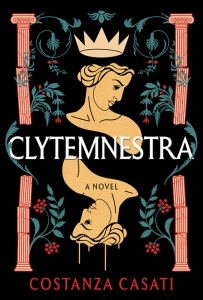Clytemnestra, a debut novel by Costanza Casati, falls into a category with many others I’ve read recently: imagining the Greek myths through the lens of a woman’s point of view. Casati has picked an interesting character to focus on here: Clytemnestra, sister of Helen of Troy, wife (and eventual killer) of Agamemnon, mother of Iphigenia who is used as a human sacrifice by her father. There’s more than enough drama in Clytemnestra’s story for an engaging novel, which this is.
I didn’t find it as purely enjoyable to read as Claire North’s books about Penelope, Madeline Miller’s Circe, or Natalie Haynes’ A Thousand Ships or Stone Blind. Rather that bringing in goddesses as narrators and using the mythic/supernatural as a central part of the story, Casati seems to be trying to retell a myth as a straight piece of historical fiction. While the gods are, of course, mentioned in Clytemnestra, the explanations for all the story’s supposedly mythic elements — including Helen being the daughter of Zeus, who rapes Leda when he’s in the form of a swan — are purely naturalistic and human-centred. This leads to a plot that sometimes feels a little strained and incredible; paradoxically, if gods, demigods, and monsters were really active in this story, it would actually feel more believable.
Despite this criticism, I did enjoy reading this take on the tragic story of Clytemnestra.
